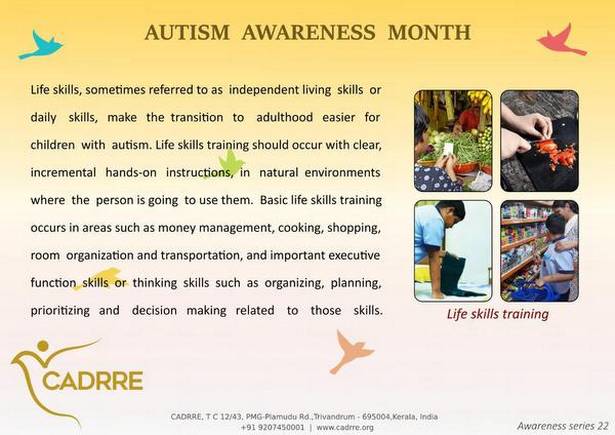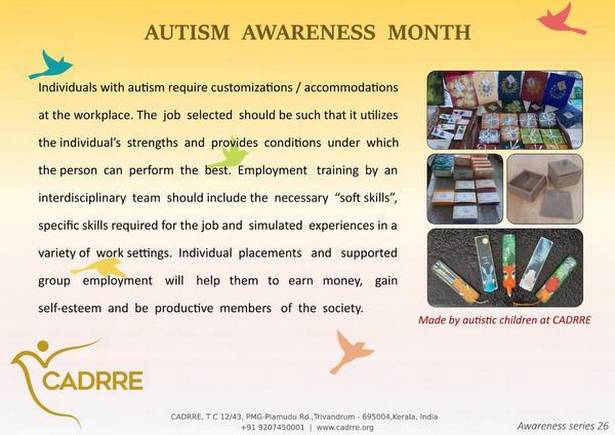
Thiruvananthapuram-based CADRRE comes up with innovative online lessons and activities for children on the autistic spectrum even as it is conducting an awareness campaign on autism on Facebook and Instagram
When the lockdown was announced, Sulekha Raja was concerned how her daughter would react. Mother of a 16-year-old on the autism spectrum, she wondered how she would cope without the comforting routine of school and sessions with her teachers and therapists. However, once The Centre for Autism and other Disabilities Rehabilitation Research and Education (CADRRE) in Thiruvananthapuram came up with online sessions, Sulekha was relieved to see her daughter settling in with online academic lessons and sessions with her therapists.
“For autistic children, any change in routine can be extremely disturbing. However, when the lockdown was enforced, we had to postpone and cancel all our plans for the month of April, which is observed as autism awareness month the world over. In addition, we had to tell the students to stay at home. We had planned a flash mob with our students, staff members and parents on April 2, which is ‘Autism Awareness Day’. All that was cancelled. Instead, we decided to come up with a seven-day awareness campaign. Online flash cards that spoke about different aspects of autism were created, one for each day. When we saw the interest generated by the cards, we decided to make it a month-long campaign. Now, we plan to make 50 cards and then bring out a book with the content used in the cards. It will be of help to parents of autistic children, special educators and counsellors,” says G Vijayaraghavan, honorary director of CADRRE.

Designed by Nandita NK, art faculty member at the institution, the content of the cards is chosen and framed by those in charge of various activities such as speech therapy, occupational therapy, music, craft and so on. “It is teamwork and every day, one such card has a brief on a particular feature of autism. It is to make the public aware about autism and the challenges and strengths of those on the spectrum,” she says.
The team at CADRRE hopes that it also helps society at large to work for an inclusive society. Meanwhile, till CADRRE closes for the annual summer vacation, the educators and the therapists engage with the students through online sessions that ensure all the areas covered in school are taken care of during the lockdown period too.
Occupational therapist Annie Charles explains: “We advise parents to have a schedule for the students, if possible with visuals. A structured routine is important for individuals on the spectrum. They (the children) find it difficult to understand why they can’t step out. To keep them active and engaged, we have regular online sessions. We send the parents detailed lesson plans, teaching resources and online worksheets to do at home and the parents have to get the child to do these. Recently, we had a webinar, a science lesson, for junior students on horticulture. We felt that the students would benefit immensely by growing a garden or micro greens.”
She adds that in most homes, teaching resources such as videos, flash cards, games etc, which are there in plenty in school, might not be available. So the faculty members and therapists take care to plan their sessions around things that might be easily accessed by parents. “For instance, in order to develop their fine motor skills, I might suggest that the parents use beads or small pebbles to work with the children,” says Annie.
Boon for parents
These online classes come as a boon for parents, says Sulekha. She says the online activities cover academics, free play, games for social interaction, communication, psychology, speech therapy, art, craft and so on. “Every month, we get an individualised education plan for each child because the needs of each person on the spectrum are different. We had just got one for April when the lockdown began. Although I was worried, now my daughter has got used to the sessions though she misses the drive to and from school,” says Sulekha, who is also a special educator and mentor for CADRRE’s students between the ages of five and eight.

Sulekha turned to social stories shared by those working with persons on the spectrum to explain to her daughter why she could not go out because of a virus that causes diseases.
At the end of a lesson, parents are requested to send the faculty members and therapists videos of their children’s work. This is to evaluate their progress during the sessions at home.
“In fact, for certain children, the lockdown has come as a blessing in disguise as they were able to spend time with their parents and their progress has been remarkable. The parents have been so dedicated about their parent-mediated interventions and extremely patient in ensuring that their children complete the work we set for them,” says speech and language pathologist Swathy A.
Article Credit: thehindu
